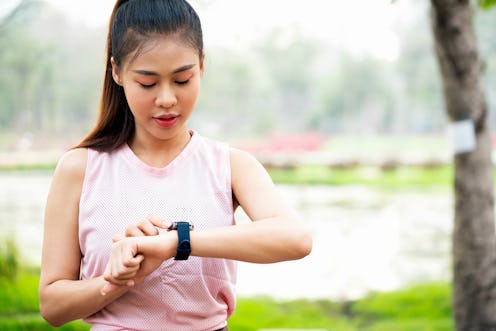
If you're concerned about your heart health, it might please you to know that there's an app for that. These apps can help you learn about your heart rate, your exercise levels, and more. And while many health-related apps encourage users to keep track of calories, plenty of people want to avoid that particular metric. If you want to track your heart health without counting calories, there's an app for that, too.
Calorie counts are a fancy way of talking about energy expenditure, which is why many apps use them to calculate "calories in" versus "calories out." Heart health apps don't have to include calorie tracking to be effective, though. Focusing on calorie counts can draw attention away from a broader image of holistic health. Making sure you're focusing on a variety of whole, unprocessed foods is more important for heart health than counting calories, says Manhattan Cardiology DO and cardiologist Dr. Roshini Malaney.
Keeping track of your calories may be helpful for some people, Dr. Malaney tells Bustle. But for people in recovery for disordered eating, heart health trackers that don't measure calories can be really helpful in avoiding that potentially triggering metric. These four apps can help you approach your cardio care in a body-neutral way.
1
Instant Heart Rate
Available on your Android or iPhone for $1.99, plus premium subscription tiers, this app offers a highly visual way to keep track of your stress levels and heart rate. Instant Heart Rate can give you insight into how your stress levels relate to your heart rate, and how sitting versus standing impacts your beats per minute. Tracking your heart rate over time can help you identify what kind of heart health practices work best for you
2
Cardiograph
If you're looking for a heart health tracking experience that's both free and interactive, Cardiograph might be for you. This free heart health tracker for your Android or iPhone measures your heart rate and is compatible with smartwatches that include heart rate sensors. If you're looking for a way to form some community around your heart health, Cardiograph also allows you to create multiple profiles for your family and friends, so you can use the same account to get your heart health on (kind of like Netflix profiles, but for your physical heart).
3
Cardiogram
If you have an Apple Watch, Fitbit, or other heart rate-sensing device, you might want to sync it up with Cardiogram (yep, "gram" not "graph"). With space to track your heart rate, workouts, and general activity levels, you can invite friends to use the app with you and compete on the leaderboard for who can log the most steps.
This app can also help you track other habits like developing a mindfulness practice, going on a daily bike ride, or improving your sleep quality. These built-in features can help you notice your current patterns and create new ones. These features are based on a subscription, though, which you can get for $14.99 per month, or pay $99 for a year upfront.
4
CardioVisual
Though it's not strictly a heart rate monitor, the CardioVisual app is a cardiologist-created heart health education app that you definitely want in your corner if you're trying to learn more about your cardiovascular health. The app features a huge library of videos, articles, and infographics to watch, read, share, and download for offline perusal. So if part of your heart health journey is arming yourself with knowledge, this might just be the app for you.
5
Monitoring your heart health is a lot easier when you don't have to think about certain metrics that can be detrimental to your emotional and physical health. Of course, no app can replace the information you get from your doctor, but carrying information about your health in your pocket can help you feel that much more empowered to be mindful of your health in less stressful ways. And less stress is great for heart health, so really, everybody wins.
Experts:
Dr. Roshini Malaney, DO, cardiologist with Manhattan Cardiology.